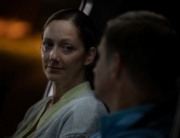![]() Ryan Gosling is not seen in full profile until near the end of what is, I believe, a five-minute tracking shot. Not since The Wrestler have we seen such a sustained hand-held shot where we follow a man into an arena of physicality as in The Place Beyond the Pines. Luke (Gosling) lifts a couple of weights to get pumped up, walks over to his tent where he gets onto a motorcycle, then performs with other stunt riders before a cheering audience. The show ends, he drives out, and the movie goes on.
Ryan Gosling is not seen in full profile until near the end of what is, I believe, a five-minute tracking shot. Not since The Wrestler have we seen such a sustained hand-held shot where we follow a man into an arena of physicality as in The Place Beyond the Pines. Luke (Gosling) lifts a couple of weights to get pumped up, walks over to his tent where he gets onto a motorcycle, then performs with other stunt riders before a cheering audience. The show ends, he drives out, and the movie goes on.
This sets up the character so well without dialogue, and director Derek Cianfrance then takes the film to the next, personal level. Luke has had a fling with a local girl, Romina (Eva Mendes), and comes back a year later to say hi. Turns out she has a baby—his—and now he feels a great deal of responsibility. Trouble is she doesn’t really want anything to do with him. She feels attracted towards him (what straight woman wouldn’t, after all), but he isn’t entirely dependable father material. Not to mention she has met another man in the interim. Now Luke is in a bind: how to provide for this baby when he no longer has the stunt job. Robbing banks could do the trick, says Luke’s friend Jack (a terrifically sleazy Craig Van Hook), and so these robberies lead Luke into a world of trouble, pursued by a beat cop in the small town of Schenectady, N.Y. From here the film turns into a cop drama involving an injured policeman, off-the-books stolen cash, and corrupt cops.
This part of the film, which also features Ray Liotta as one such cop, benefits from Cianfrance’s direction, which, as in Blue Valentine, allows for raw, naturalistic performances to uplift the more genre-trope elements. As the honorable cop, Bradley Cooper is very good, a decent guy with a baby at home (same age as Luke’s baby) who is much too smart to go crooked—much better to take the whole bloody lot of them down and become the district attorney instead.
Just when I thought the film might be near its finish, it turns into, as Cianfrance has said in interviews, what the film may really be about. Moving ahead 15 years, little AJ (Avery’s kid) and little Jason (Luke and Romina’s son) are now teenagers, and as (bad) luck would have it, they wind up at the same high school. AJ is a little s***, into lots of drugs and being an a-hole, while Jason, not an innocent, is just a kid without his father. How will this all come into play…?
There is a lot going on in The Place Beyond the Pines, and in an odd way it’s a little like a Pulp Fiction narrative, which is surprising considering how much Cianfrance, once a documentarian (as was co-writer Ben Coccio), takes such crime-drama elements so straight-on, brushing away artifice.
What I remember most fondly, and would love to revisit over and over, is the storyline with Luke. Gosling really shines like I haven’t seen before—the role combines the best parts about his character in Drive (also as a stunt driver and professional criminal, with a moody, quiet-but-could-pop-any-minute steadiness) and in Blue Valentine (a rough guy but with a big heart). It’s just impossible to take your eyes off of him here. He’s so good that he makes Eva Mendes, usually just adequate in her roles, rise up in their intimate, intense scenes. So by the time Luke robs those banks, we’re on the edge of our seats as Luke goes too far, but we understand exactly why. (Though I couldn’t let go of the casting of Liotta. Perhaps I have just seen him play too many hot-headed cops that it felt like type-casting.)
The first two acts are so strong dramatically that the third act suffers due to less Cooper and more of the teenagers. Dane DeHaan is more subtle as Jason, a confused, angry but intelligent young man, but after so many characters that feel whole and three-dimensional—be they male or female (Rose Byrne has a good small role as Cooper’s wife)—AJ (Emory Cohen) comes off as a little druggie brat without a shred of sympathy and much less believability. When the main conflict comes to a head, it’s hard not to guess how things will go down between these two sons of fate.
And yet for all its missteps in casting or writing, The Place Beyond the Pines is a small gem of filmmaking because of how much Cianfrance trusts his two leads, and for his skill in stripping down the material to its dramatic meat and bones. There’s no flash, no super-stylized dialog (albeit there is wit), it’s just the big, sorta epic story of fathers and sons torn asunder by crimes, punishment, and loyalties. Gosling, in his most affecting work to date, plus the naturalistic atmosphere elevate this film to grand tragedy.

















Leave A Comment